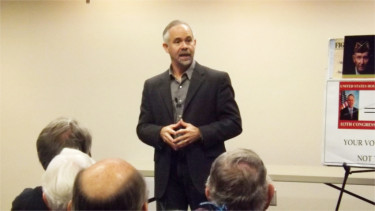

U.S. Congressman Tim Huelskamp speaks to the audience in the Manhattan Public Library. Huelskamp held a town hall meeting in the Little Apple — his first town hall of 2016. (Staff photo by Brady Bauman)
U.S. Congressman Tim Huelskamp opened up Tuesday afternoon’s town hall meeting in the Manhattan Public Library touting how this one — his first of 2016 — adds to the 332 he’s done as representative of Kansas’ “Big First” district.
And he had an audience.
Citizens packed the library’s upstairs auditorium and there was a mix of both support and opposition for the congressman.
Some members of the audience attacked his repeated attempts to repeal ObamaCare and praised parts of the law, especially its provisions that bar insurance companies from refusing plans to those with pre-existing conditions and keeping children on parents’ plans till the age of 26.
One man who touted those attributes and others of the law even drew applause from some in the room.
And of course, there were those who encouraged Huelskamp and his colleagues in the House of Representatives to try repealing the law again, perhaps thinking that after 50-plus failed attempts, approval from the U.S. Supreme Court and a guaranteed repeated presidential veto, there’s still hope that somehow it can be erased.
Huelskamp did criticize his own party, though, on those repeal attempts and said more should be done for replacement of the law.
Themes of Huelskamp’s town hall also included many mentions of former House Speaker John Boehner and President Barack Obama, and how they were roadblocks to the will of the GOP. If one were to listen to Huelskamp speak about Boehner long enough, a conclusion could be drawn that he and Huelskamp didn’t share the same letter before their names, even though they are both conservative Republicans.
One early exchange between Huelskamp and a retired K-State professor dealt with the minimum wage. The professor shared the struggles of his granddaughter, who is single, independent, going to school and works at Dairy Queen for wages that barely crack more than $17,000 a year. He said his granddaughter had had recent car troubles and that she’d asked him for a loan to pay for repairs.
The professor demanded Huelskamp to defend his rational for not supporting a raise in the federal minimum wage.
“It does not make sense to the young people out here who have to live on less than poverty wages,” he told the congressman.
Although there are many reports that show job growth in cities that do raise their minimum wages, Huelskamp didn’t give the idea much support.
Instead, he asked the man what he’d raise it to. When the man referenced the president’s push for $10.10 per hour, Huelskamp questioned if that was a livable wage.
Huelskamp then seemed to question the overall idea of a minimum wage.
“We can’t figure out the level,” Huelskamp said. “Why should government — why would somebody in Washington — be dictating $10.10, $8.10, $7.50?
“My personal story would be this: I have a daughter who’s a lifeguard at the (YMCA). What she’s getting paid is minimum wage. You raise minimum wage you know what’s going to happen? She won’t have a job anymore, because it’s not worth more than $7.50 an hour.”
Huelskamp also mentioned, of all things, gas pumps.
“Do you still know of anybody that pumps gas anymore?” he asked. “No, they’ve all been replaced. Nobody is going to pump gas for $7.50 an hour when a credit card can take care of that.”
That didn’t change the man’s mind.
“That stand does not make sense in today’s age,” he responded.
Huelskamp also said he’d continue to be tough on ISIS and the vetting of Syrian refugees. Other issues he spoke about dealt with Veteran Affairs reforms — especially when it came to accessible healthcare for veterans — and he warned of what he thinks will be a big year of federal regulations.
Manhattan-Ogden USD 383 School Board Vice President Aaron Estabrook said after the meeting that it was clear emotions were high for some in the crowd.
When it came to education, Estabrook criticized Huelskamp’s vote against the “Every Student Succeeds Act,” which replaced the universally panned “No Child Left Behind” law and is more focused on local control.
Huelskamp has eluded that the new law is just a continuation of “No Child Left Behind.”
“My reading absolutely is different in that it is not,” Estabrook said. “It actually ends ‘No Child Left Behind.’ It takes away governmental controls. It gives more authority to the local board. Those are good things. It also allows for military students to be identified and to gain more resources, which is really important to our community.”
Estabrook said Huelskamp’s vote against the new act was more about politics than policy.
“Pure political reasons,” he said. “Everything in there is not perfect, but it’s a better step forward than what we had and we need to be taking those steps.”
Huelskamp will have primary challengers in Roger Marshall, an obstetrician and gynecologist from Great Bend, and Alan LaPolice, a student retention specialist at Cloud County Community College from Clyde in August.

